高中英语人教版必修一Unit 4 Earthquakes Workbook课件(63张)
文档属性
| 名称 | 高中英语人教版必修一Unit 4 Earthquakes Workbook课件(63张) |
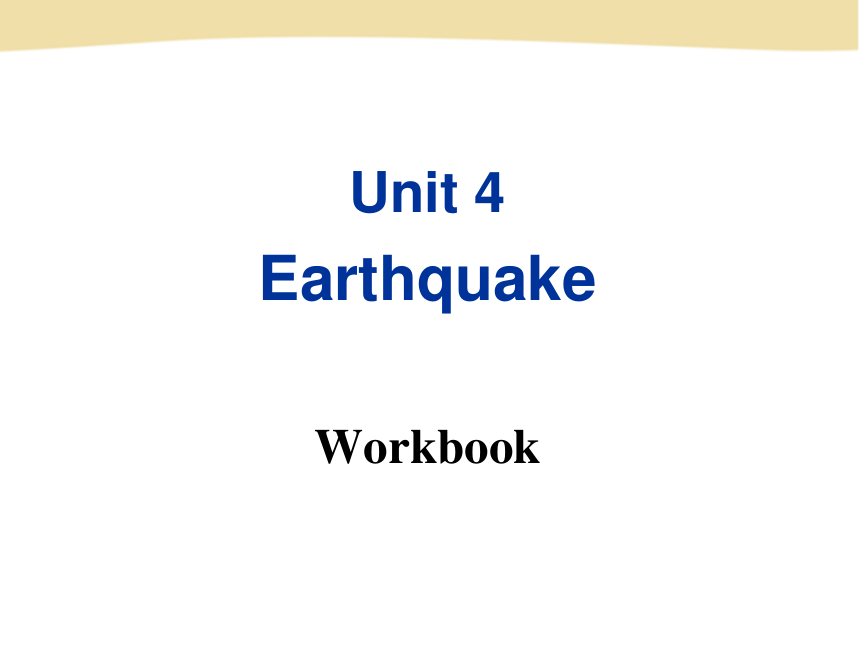
|
|
| 格式 | zip | ||
| 文件大小 | 1.2MB | ||
| 资源类型 | 教案 | ||
| 版本资源 | 人教版(新课程标准) | ||
| 科目 | 英语 | ||
| 更新时间 | 2020-05-07 09:02:32 | ||
图片预览

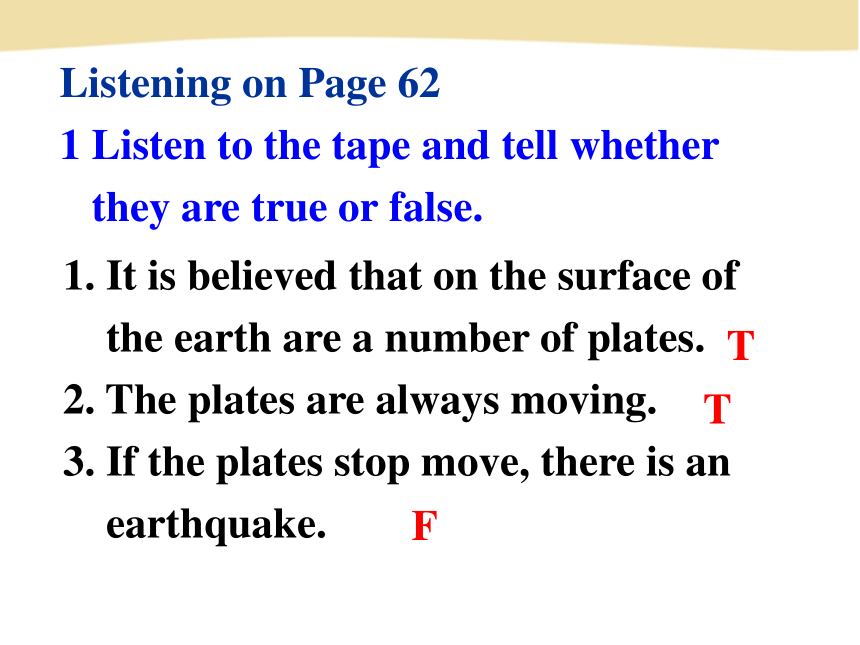
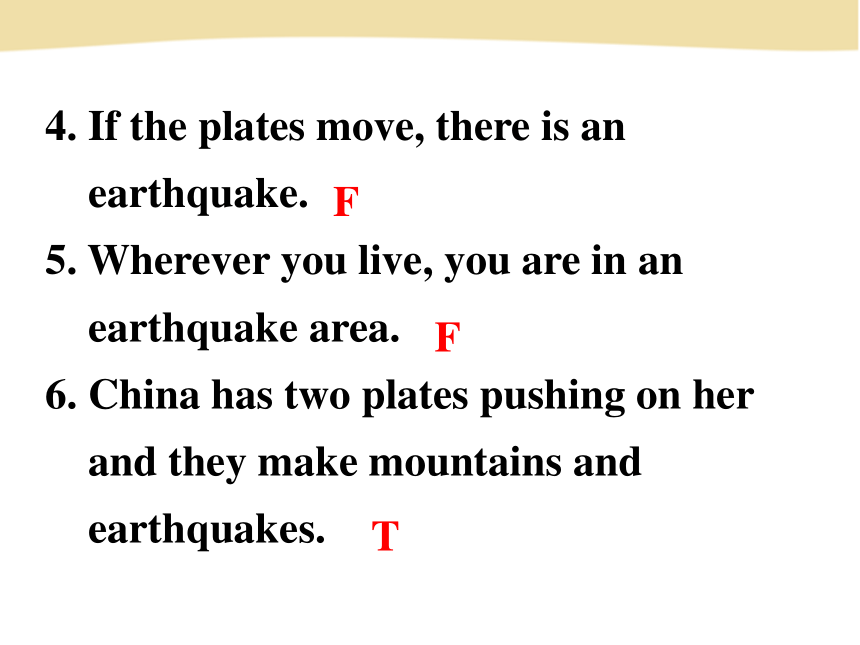
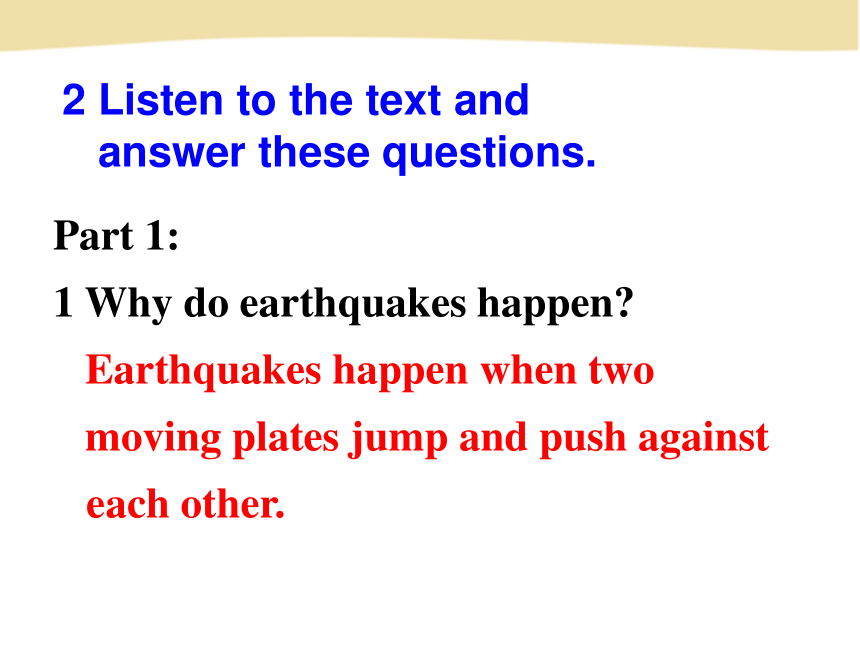

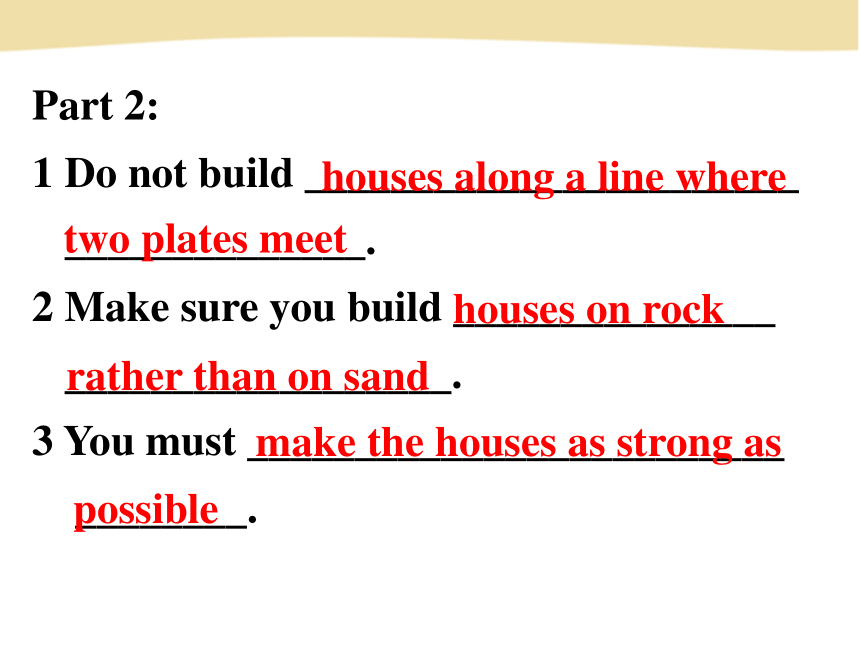
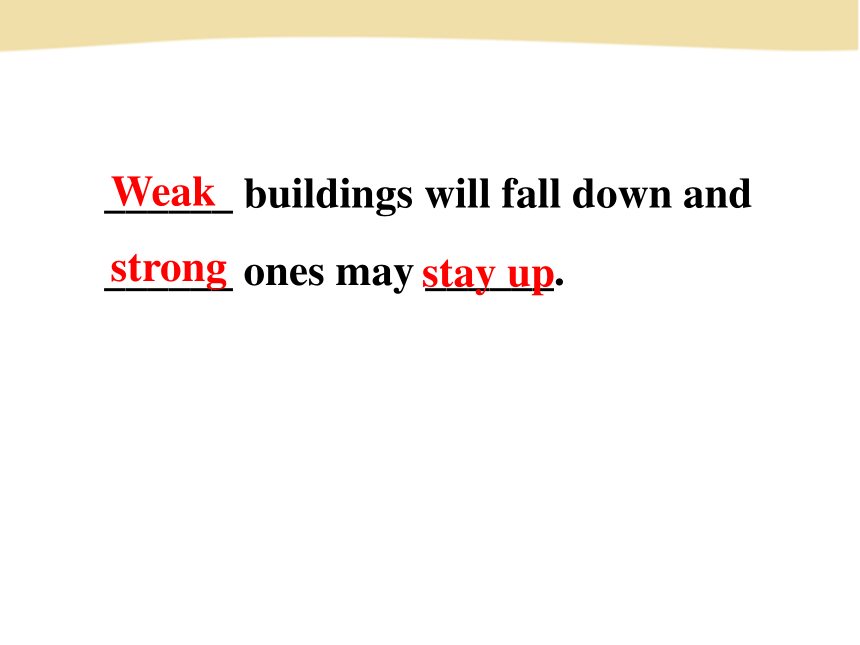
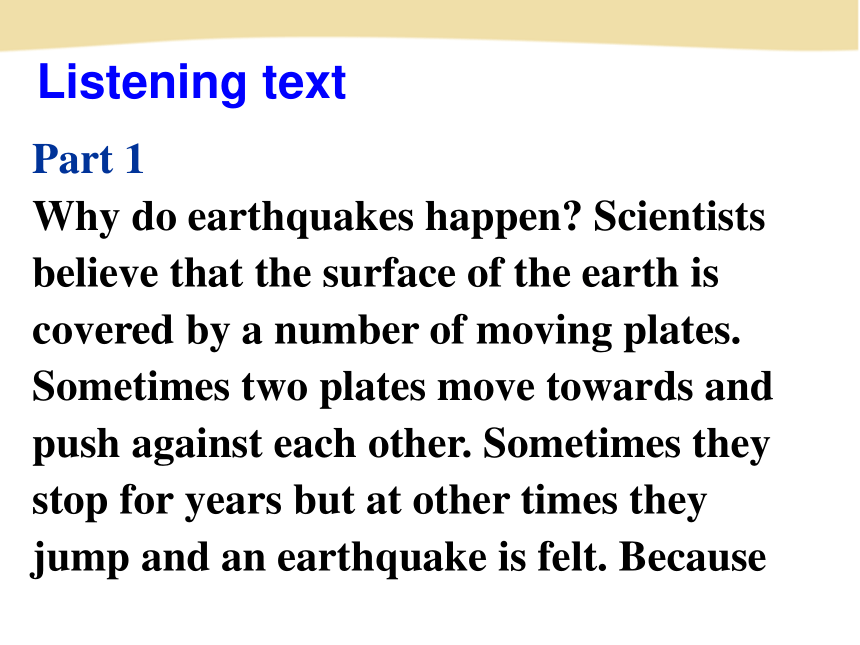
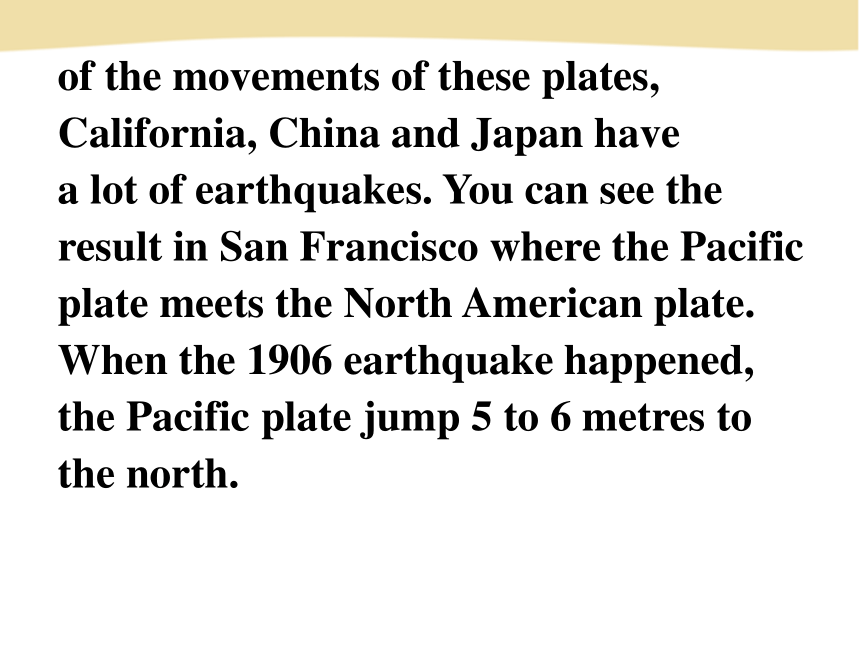
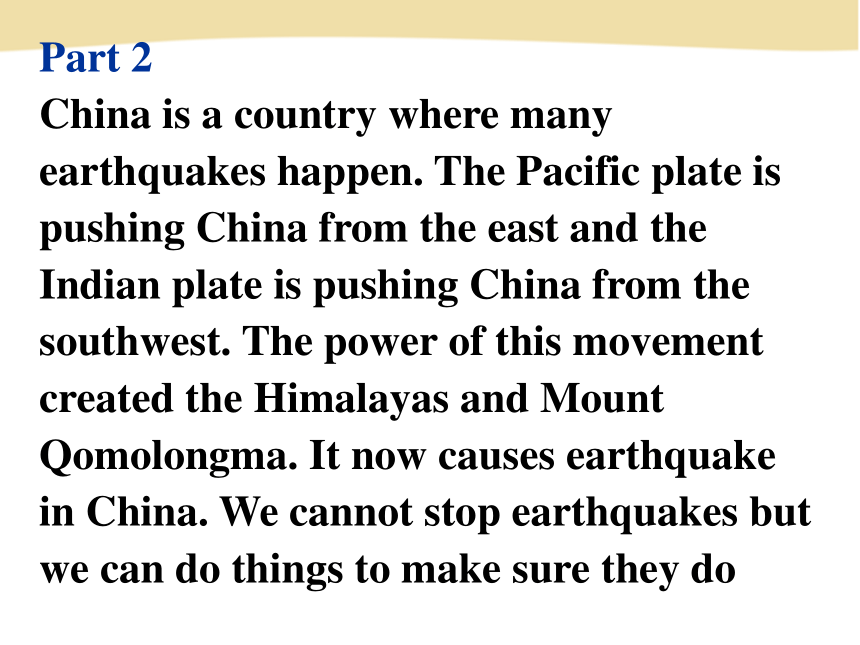
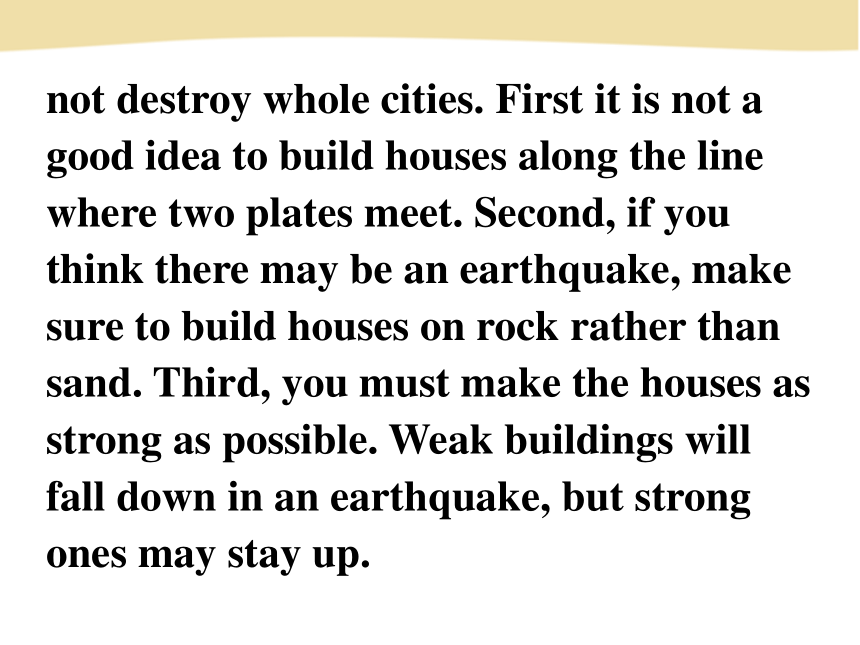
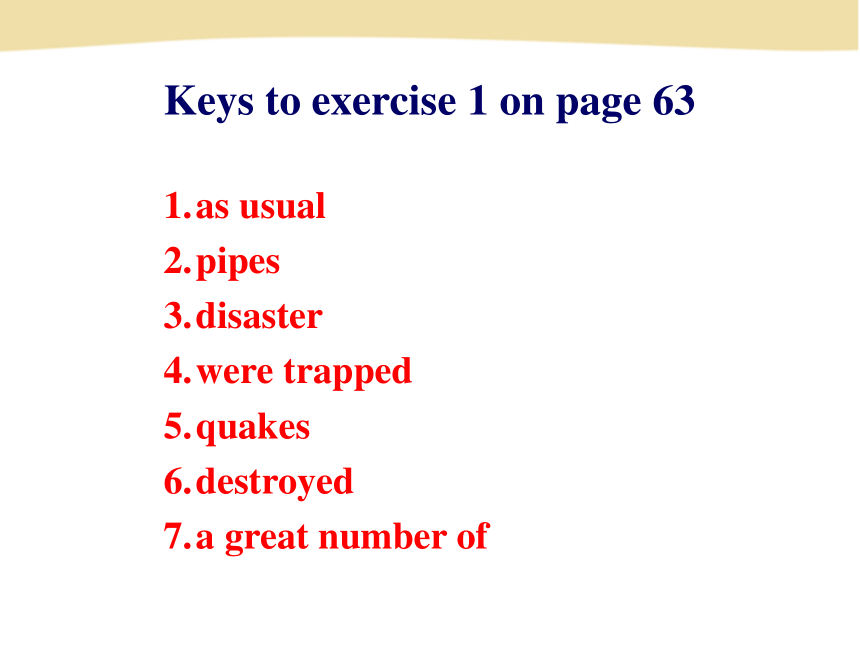
文档简介
课件63张PPT。Unit 4
Earthquake
Workbook 1. It is believed that on the surface of the earth are a number of plates.
2. The plates are always moving.
3. If the plates stop move, there is an earthquake.Listening on Page 62
1 Listen to the tape and tell whether
they are true or false.TTF4. If the plates move, there is an
earthquake.
5. Wherever you live, you are in an
earthquake area.
6. China has two plates pushing on her
and they make mountains and
earthquakes.FFT2 Listen to the text and
answer these questions.Part 1:
1 Why do earthquakes happen?
Earthquakes happen when two
moving plates jump and push against each other.2 Why do California, China and Japan have a lot of earthquakes?
California, Japan and China have a lot of earthquakes because they are placed in areas where different plates meet.Part 2:
1 Do not build _______________________
______________.
2 Make sure you build _______________
__________________.
3 You must _________________________
________. houses along a line where
two plates meet houses on rock rather than on sand make the houses as strong as possible______ buildings will fall down and
______ ones may ______. Weak strong stay upPart 1
Why do earthquakes happen? Scientists believe that the surface of the earth is covered by a number of moving plates. Sometimes two plates move towards and push against each other. Sometimes they stop for years but at other times they jump and an earthquake is felt. BecauseListening textof the movements of these plates,
California, China and Japan have
a lot of earthquakes. You can see the
result in San Francisco where the Pacific
plate meets the North American plate.
When the 1906 earthquake happened,
the Pacific plate jump 5 to 6 metres to
the north.Part 2
China is a country where many earthquakes happen. The Pacific plate is pushing China from the east and the Indian plate is pushing China from the southwest. The power of this movement created the Himalayas and Mount Qomolongma. It now causes earthquake in China. We cannot stop earthquakes but we can do things to make sure they do not destroy whole cities. First it is not a good idea to build houses along the line where two plates meet. Second, if you think there may be an earthquake, make sure to build houses on rock rather than sand. Third, you must make the houses as strong as possible. Weak buildings will fall down in an earthquake, but strong ones may stay up.Keys to exercise 1 on page 63as usual
pipes
disaster
were trapped
quakes
destroyed
a great number of
1.?The judge gave a prize and his
congratulations to the cyclist who
won the competition.
2.?The title of that book is The Ship Buried
at the Bottom of the Sea.
3.?The miners who had been trapped in
the mine for two days were finally
rescued. Translation Ex. 2 (page 63)4.?The reporter realized that the girl
was so frightened and was trying to
avoid the question.
5.?The fire destroyed two shops which are
about four blocks from here.
6.?The balloon burst suddenly which
shocked us. 7.?I can’t express how I feel/ I am feeling
at the moment.
8. He refused to talk about the sufferings
he had during the disaster.
9. When he wakes up every morning, he
will read the headlines in the
newspaper very quickly.Answers to Exercise 3 Find out the answer
Hand out homework
Try out ideas
Keep out the cold
Put out a fire
Take out the rubbish
Work out an outline
Dig out potatoes
Using structureswhose homes are in an earthquake area
which is not earthquake safe
that are thick and strong.
which has bolts underneath and no
broken windows.
5. which are not tied or stuck to tables
6. who stands close to windows
7. whom this advice is written Answers to exercise 1 on page 64The story of an eyewitnessReading taskby Jack London5:13 a.m. April 18th, 1906fire around the Call BuildingDreadful earthquake damage
in Chinatownthe destroyed churchdamaged warehouserefugees fleeing along the StreetThe Army later provided tents for refugees.poorly- built shelters1 Read and finish the exercises.1.Write an adjective to describe how the author
felt about the earthquake and what it did.
Why did you choose this word?Shocked. London is both greatly surprised and frightened by what he sees, so shocked
is a good word to describe his feelings.2.Write an adjective to describe how the author
felt about the people during the earthquake.
Why did you choose these word?Sad.London knows that many families lost
their loved ones and all their possessions.2 Read the first paragraph in this passage.
Then go back and read again the first
paragraph of the passage on page 26.
Compare the ways both writers give you
details about the earthquakes.Detailed Reading (3m)signs that showed an earthquake
was comingdescription of the devastation caused by the earthquakebuild up of tension by description of signs
events described chronologicallyemotive description
of the destruction
2. use of repetition to
build tensionsomething very bad about to happenworst earthquake over use of exaggeration to add tensionunaware of implications of the signs--- in ignorancenot given How do you know?1.Which writer shows more feeling about the earthquake?
A. The writer of the Tangshan quake in 1976
B. The writer of the San Francisco in 1906B. The writer of the San Francisco in 1906Because he is an eyewitness. He is also writing a personal report, not a history lesson.2. Both writers give similar details about
_________________________
and _____________________.the people hurt by the quakethe things it destroyed3.Which one of the following statements
is true?
A. Both writers give details of big events before little events.
B Both writers give details of little events before big events.
C Neither writer gives details of big events before little events.C Neither writer gives details of big events before little events.3.Which one of the following statements is not true?
Both writers saw the earthquake he wrote about.
B. Only one writer saw the earthquake he wrote about.
C. Neither writer saw the earthquake he wrote about.B. Only one writer saw the earthquake he wrote about.3 Do you believe the writer’s description?
Give your reasons.Yes, I believe the writer’s description, because …No, I don’t believe …2 When you listen the first time write down the three key words that are mentioned.1 drop 2 cover 3 holdListening task on P662nd thing I must do: Make sure I hide under something like a table to protect myself from things falling on top of me.
3rd thing I must do: I must hold onto the furniture so it doesn’t move away from me during the earthquake.1st thing I must do: I must drop to the floor and cover my head and neck with my hands.3 Give more details about the three “things”4 Any other advice you think useful:
If you are outside, you should ____________________________________________________________________
If you are in the living room, you should ______________________________________________________________________________________________________keep away from power lines, trees, signs, cars and buildings.make sure that the bookcases are fastened to the wall and the TV set is tied to a table so that they can’t move.If you are in the house alone, you should
__________________________________
___________________________________
_____________ring a family friend to tell them where you are and collect your personal earthquake bag.Listening text Practise and prepare
Ever since the San Francisco earthquake,
all children in California have been taught
what to do during an earthquake.
Part 1
Teachers: Now, students, do you remember
what we should do before an
earthquake comes?S1: We must make a list of things. It
should tell us what to do, where to be
safe and who to contact.
T: Good. So first what should we do?
S2: We should “drop, cover and hold”.
T: Excellent. Now what does that mean?
S1: We must drop to the floor and cover
our heads with our hands. T: Right?
S3: We must hold onto the furniture so it
doesn’t move away from us during the
earthquake.
T: Well done. So don’t forget. It’s always
“drop, cover and hold”.Part 2
T: Now suppose you are outside when an earthquake comes. What should you do?
S3: Go to an open space away from buildings, trees or power lines.
S1: I should tie the television to a table so it won’t move. I should make sure that the bookcases are already tied to the wall.T: Fine, but what should you do if you
are alone when the earthquake starts?
S2: Ring a family friend to tell them
where I am and collect my personal
earthquake bag.T: Quite right. You’ve done a great job.
Now for your homework I want you to
think about what to put into your
earthquake bag. We’ll discuss tomorrow.Make sure that you only take essential things with you. They must last you five days.Speaking task on Page 67personal washing thingsfood and chocolate barsimportant papersbowls and chopsticksidentity cardcandlesbottle of watermoneypersonal washing thingsa bottle of water moneytorchmobile phonefood and
chocolate
barsblanketMy personal earthquake bag will containmedicineThe bag will
containSampleS1: What do you think we’ll need in our
personal earthquake bag?
S2: If we have to collect things we need
for five days, the most important
things will be the bottle of water, candles, money and personal washing things. That makes four, do you agree?S1: Yes, they sound good choices. I also think we need a torch, a mobile phone and a blanket. Another one?
S2: OK. But now we have difficulties. I would like food and sweets. We’ll really need food if we’re to be on our own for five days before rescue comes.
S1: No, I don’t agree. Food and sweets is a good idea but the medicine would also be very useful.S2: I agree. So we have to choose whether to take the food and sweets and the medicine to make our eight items.
S1: OK. Now, let’s make the list: water, candles, money and personal washing things, food and sweets, a torch, mobile phone and blanket. If we want to add the medicine as well, what can we remove?S2: Well, the candles and the torch do seem to be the same. Why don’t we remove the candles (in case we don’t have matches) and replace them with the medicine?
S1: Yes. That seems to solve the problem. OK. Let’s put the medicine in and take the candles out. Now our list is complete. Let’s tell the class our ideas and see if they have the same ideas…What are you going to do if
an earthquake happens?If you are……SpeakingSuggest answer If you were sleeping in your bedroom when the quake happened, you would get up quickly first, next you would wake up your family and your neighbours. Then you could run to a safe place. So that you could escape being trapped or killed.Remember: These thing should be avoided:standing close to a building
(because it may fall on you if it
is weakened by the earthquake.)
2. standing under a tree
(because it may fall on you)
3. going too close to power lines
( because you may be badly affected
by electricity if they fall on you.)A posterWhat the poster is
about and why.The items and
why they are chosen.What should be
avoided and why.Writing task
on Page 67PracticeWrite a poster in class according to the three parts given above. When it is completed, display your poster in the classroom.Sample poster
An earthquake may happen at any time
so it’s best to prepare your personal earthquake bag.Collect these items and keep them somewhere near you.
1 a bottle of water 2 money
3 personal washing things 4 food and sweets 5 a torch
6 mobile phone 7 a blanket
8 medicine
Remember:
Do not put fresh fruit in the bag as it will go bad quickly and cause problems.
IT IS BETTER TO BE PREPARED THAN SORRY!destroy, rescue, strange, much, team
earthquake, shake, bury, fall, teamSeveral days before July 28, 1976, many s______ things happed in Tanshan. They were signs for the e_________. But people in the city of Tangshan didn’t think m____ of these. At 3: 42 am that day, the earth began to s_____, which d________ the city. trangearthquakeuchhakeestroyed选词填空Many people, including workers and doctors, came to r_____ those t______ under the ruins. Later that afternoon, another big earthquake struck Tangshan. More people were killed or injured and more buildings f___ down. Soldiers were called in to help the rescue workers. T_____ were organized to dig out the trapped and b___ the dead.escuerappedelleamsuryHomework1. Try to remember the words and
expressions in this unit.
2. Use some adjectives to describe
a natural disaster you have ever
experienced.Thank You!
Earthquake
Workbook 1. It is believed that on the surface of the earth are a number of plates.
2. The plates are always moving.
3. If the plates stop move, there is an earthquake.Listening on Page 62
1 Listen to the tape and tell whether
they are true or false.TTF4. If the plates move, there is an
earthquake.
5. Wherever you live, you are in an
earthquake area.
6. China has two plates pushing on her
and they make mountains and
earthquakes.FFT2 Listen to the text and
answer these questions.Part 1:
1 Why do earthquakes happen?
Earthquakes happen when two
moving plates jump and push against each other.2 Why do California, China and Japan have a lot of earthquakes?
California, Japan and China have a lot of earthquakes because they are placed in areas where different plates meet.Part 2:
1 Do not build _______________________
______________.
2 Make sure you build _______________
__________________.
3 You must _________________________
________. houses along a line where
two plates meet houses on rock rather than on sand make the houses as strong as possible______ buildings will fall down and
______ ones may ______. Weak strong stay upPart 1
Why do earthquakes happen? Scientists believe that the surface of the earth is covered by a number of moving plates. Sometimes two plates move towards and push against each other. Sometimes they stop for years but at other times they jump and an earthquake is felt. BecauseListening textof the movements of these plates,
California, China and Japan have
a lot of earthquakes. You can see the
result in San Francisco where the Pacific
plate meets the North American plate.
When the 1906 earthquake happened,
the Pacific plate jump 5 to 6 metres to
the north.Part 2
China is a country where many earthquakes happen. The Pacific plate is pushing China from the east and the Indian plate is pushing China from the southwest. The power of this movement created the Himalayas and Mount Qomolongma. It now causes earthquake in China. We cannot stop earthquakes but we can do things to make sure they do not destroy whole cities. First it is not a good idea to build houses along the line where two plates meet. Second, if you think there may be an earthquake, make sure to build houses on rock rather than sand. Third, you must make the houses as strong as possible. Weak buildings will fall down in an earthquake, but strong ones may stay up.Keys to exercise 1 on page 63as usual
pipes
disaster
were trapped
quakes
destroyed
a great number of
1.?The judge gave a prize and his
congratulations to the cyclist who
won the competition.
2.?The title of that book is The Ship Buried
at the Bottom of the Sea.
3.?The miners who had been trapped in
the mine for two days were finally
rescued. Translation Ex. 2 (page 63)4.?The reporter realized that the girl
was so frightened and was trying to
avoid the question.
5.?The fire destroyed two shops which are
about four blocks from here.
6.?The balloon burst suddenly which
shocked us. 7.?I can’t express how I feel/ I am feeling
at the moment.
8. He refused to talk about the sufferings
he had during the disaster.
9. When he wakes up every morning, he
will read the headlines in the
newspaper very quickly.Answers to Exercise 3 Find out the answer
Hand out homework
Try out ideas
Keep out the cold
Put out a fire
Take out the rubbish
Work out an outline
Dig out potatoes
Using structureswhose homes are in an earthquake area
which is not earthquake safe
that are thick and strong.
which has bolts underneath and no
broken windows.
5. which are not tied or stuck to tables
6. who stands close to windows
7. whom this advice is written Answers to exercise 1 on page 64The story of an eyewitnessReading taskby Jack London5:13 a.m. April 18th, 1906fire around the Call BuildingDreadful earthquake damage
in Chinatownthe destroyed churchdamaged warehouserefugees fleeing along the StreetThe Army later provided tents for refugees.poorly- built shelters1 Read and finish the exercises.1.Write an adjective to describe how the author
felt about the earthquake and what it did.
Why did you choose this word?Shocked. London is both greatly surprised and frightened by what he sees, so shocked
is a good word to describe his feelings.2.Write an adjective to describe how the author
felt about the people during the earthquake.
Why did you choose these word?Sad.London knows that many families lost
their loved ones and all their possessions.2 Read the first paragraph in this passage.
Then go back and read again the first
paragraph of the passage on page 26.
Compare the ways both writers give you
details about the earthquakes.Detailed Reading (3m)signs that showed an earthquake
was comingdescription of the devastation caused by the earthquakebuild up of tension by description of signs
events described chronologicallyemotive description
of the destruction
2. use of repetition to
build tensionsomething very bad about to happenworst earthquake over use of exaggeration to add tensionunaware of implications of the signs--- in ignorancenot given How do you know?1.Which writer shows more feeling about the earthquake?
A. The writer of the Tangshan quake in 1976
B. The writer of the San Francisco in 1906B. The writer of the San Francisco in 1906Because he is an eyewitness. He is also writing a personal report, not a history lesson.2. Both writers give similar details about
_________________________
and _____________________.the people hurt by the quakethe things it destroyed3.Which one of the following statements
is true?
A. Both writers give details of big events before little events.
B Both writers give details of little events before big events.
C Neither writer gives details of big events before little events.C Neither writer gives details of big events before little events.3.Which one of the following statements is not true?
Both writers saw the earthquake he wrote about.
B. Only one writer saw the earthquake he wrote about.
C. Neither writer saw the earthquake he wrote about.B. Only one writer saw the earthquake he wrote about.3 Do you believe the writer’s description?
Give your reasons.Yes, I believe the writer’s description, because …No, I don’t believe …2 When you listen the first time write down the three key words that are mentioned.1 drop 2 cover 3 holdListening task on P662nd thing I must do: Make sure I hide under something like a table to protect myself from things falling on top of me.
3rd thing I must do: I must hold onto the furniture so it doesn’t move away from me during the earthquake.1st thing I must do: I must drop to the floor and cover my head and neck with my hands.3 Give more details about the three “things”4 Any other advice you think useful:
If you are outside, you should ____________________________________________________________________
If you are in the living room, you should ______________________________________________________________________________________________________keep away from power lines, trees, signs, cars and buildings.make sure that the bookcases are fastened to the wall and the TV set is tied to a table so that they can’t move.If you are in the house alone, you should
__________________________________
___________________________________
_____________ring a family friend to tell them where you are and collect your personal earthquake bag.Listening text Practise and prepare
Ever since the San Francisco earthquake,
all children in California have been taught
what to do during an earthquake.
Part 1
Teachers: Now, students, do you remember
what we should do before an
earthquake comes?S1: We must make a list of things. It
should tell us what to do, where to be
safe and who to contact.
T: Good. So first what should we do?
S2: We should “drop, cover and hold”.
T: Excellent. Now what does that mean?
S1: We must drop to the floor and cover
our heads with our hands. T: Right?
S3: We must hold onto the furniture so it
doesn’t move away from us during the
earthquake.
T: Well done. So don’t forget. It’s always
“drop, cover and hold”.Part 2
T: Now suppose you are outside when an earthquake comes. What should you do?
S3: Go to an open space away from buildings, trees or power lines.
S1: I should tie the television to a table so it won’t move. I should make sure that the bookcases are already tied to the wall.T: Fine, but what should you do if you
are alone when the earthquake starts?
S2: Ring a family friend to tell them
where I am and collect my personal
earthquake bag.T: Quite right. You’ve done a great job.
Now for your homework I want you to
think about what to put into your
earthquake bag. We’ll discuss tomorrow.Make sure that you only take essential things with you. They must last you five days.Speaking task on Page 67personal washing thingsfood and chocolate barsimportant papersbowls and chopsticksidentity cardcandlesbottle of watermoneypersonal washing thingsa bottle of water moneytorchmobile phonefood and
chocolate
barsblanketMy personal earthquake bag will containmedicineThe bag will
containSampleS1: What do you think we’ll need in our
personal earthquake bag?
S2: If we have to collect things we need
for five days, the most important
things will be the bottle of water, candles, money and personal washing things. That makes four, do you agree?S1: Yes, they sound good choices. I also think we need a torch, a mobile phone and a blanket. Another one?
S2: OK. But now we have difficulties. I would like food and sweets. We’ll really need food if we’re to be on our own for five days before rescue comes.
S1: No, I don’t agree. Food and sweets is a good idea but the medicine would also be very useful.S2: I agree. So we have to choose whether to take the food and sweets and the medicine to make our eight items.
S1: OK. Now, let’s make the list: water, candles, money and personal washing things, food and sweets, a torch, mobile phone and blanket. If we want to add the medicine as well, what can we remove?S2: Well, the candles and the torch do seem to be the same. Why don’t we remove the candles (in case we don’t have matches) and replace them with the medicine?
S1: Yes. That seems to solve the problem. OK. Let’s put the medicine in and take the candles out. Now our list is complete. Let’s tell the class our ideas and see if they have the same ideas…What are you going to do if
an earthquake happens?If you are……SpeakingSuggest answer If you were sleeping in your bedroom when the quake happened, you would get up quickly first, next you would wake up your family and your neighbours. Then you could run to a safe place. So that you could escape being trapped or killed.Remember: These thing should be avoided:standing close to a building
(because it may fall on you if it
is weakened by the earthquake.)
2. standing under a tree
(because it may fall on you)
3. going too close to power lines
( because you may be badly affected
by electricity if they fall on you.)A posterWhat the poster is
about and why.The items and
why they are chosen.What should be
avoided and why.Writing task
on Page 67PracticeWrite a poster in class according to the three parts given above. When it is completed, display your poster in the classroom.Sample poster
An earthquake may happen at any time
so it’s best to prepare your personal earthquake bag.Collect these items and keep them somewhere near you.
1 a bottle of water 2 money
3 personal washing things 4 food and sweets 5 a torch
6 mobile phone 7 a blanket
8 medicine
Remember:
Do not put fresh fruit in the bag as it will go bad quickly and cause problems.
IT IS BETTER TO BE PREPARED THAN SORRY!destroy, rescue, strange, much, team
earthquake, shake, bury, fall, teamSeveral days before July 28, 1976, many s______ things happed in Tanshan. They were signs for the e_________. But people in the city of Tangshan didn’t think m____ of these. At 3: 42 am that day, the earth began to s_____, which d________ the city. trangearthquakeuchhakeestroyed选词填空Many people, including workers and doctors, came to r_____ those t______ under the ruins. Later that afternoon, another big earthquake struck Tangshan. More people were killed or injured and more buildings f___ down. Soldiers were called in to help the rescue workers. T_____ were organized to dig out the trapped and b___ the dead.escuerappedelleamsuryHomework1. Try to remember the words and
expressions in this unit.
2. Use some adjectives to describe
a natural disaster you have ever
experienced.Thank You!
